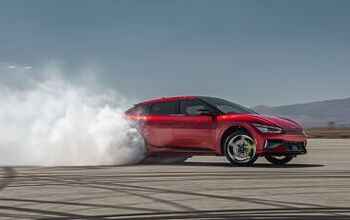GM And Isuzu Want To Rekindle Old Tie-Up

Here some background on the GM/Isuzu tie-up. Japanese wire services such as The Nikkei [sub] and Jiji report that GM approached Isuzu and “informally proposed acquiring a stake” in the Japanese truck maker. The source is an unnamed executive of Isuzu.
According to The Nikkei [sub], GM and Isuzu will start negotiations in early May for a roughly 10 percent share. If the negotiations are successful, Isuzu President Susumu Hosoi and GM CEO Dan Akerson could meet this summer to sign the agreement.
Holding a 9.2 percent share, Japanese trading house Mitsubishi is the largest shareholder of Isuzu. If the talks are successful, that title will pass to GM.
Isuzu and GM go a long way back. In 1971, General Motors purchased a 34.2 percent share of Isuzu. Isuzu’s KB pickup truck was sold through GM dealerships in the United States beginning in 1972. More light trucks were added. Isuzu also produced the luckless Chevrolet LUV from 1972 through 1982.
In 1974, Isuzu built the Opel Kadett under the Isuzu nameplate as the Bellett Gemini. In 1976 GM imported the Gemini into the United States as the Buick Opel. Few knew that the German car, sold through GM dealerships, was actually manufactured in Japan.
In 1999, GM had 49 percent of the company, effectively gaining control of the company. One of GM’s strategic planners, Donald T. Sullivan, was installed as executive vice-president of operations. No Japanese manufacturer had ever involved a non-Japanese speaking manager in such a high position before.
Shortly thereafter, the romance began to sour. In 2002, Isuzu started to buy back its shares from an increasingly cash-strapped GM, reducing GM’s 49 percent share to 12 percent.
Then, things get a little murky. The official history timelines are mum in regards to GM’s final disengagement. “Due to financial difficulties, the United States’ GM sold its 7.9 percent stake in Isuzu in 2006,” says the Yomiuri Shimbun. Shortly thereafter, Toyota bought a 5.9 percent share in Isuzu.
Isuzu will have to evaluate GM’s advances carefully, because a lot is at risk, and there is more than one knot that needs to be untied. “A reforging of ties between the two could trigger a response from Toyota,” says the Nikkei. Translation: Toyota will most likely dump the stock. Isuzu will also end capital tie-up talks with Volkswagen . According to Japanese media, Isuzu still hopes to supply pickup trucks to Volkswagen in Thailand, where they will be sold as VWs.
Judging from the high-level leaks to sympathetic Japanese business wires, some executives at Isuzu might not be too excited about the rekindling of the romance. As part of its default, GM has stiffed Isuzu with bills of $1.7 billion, some people say. As it turns out, the on-line sources confused 1.7 billion dollars with 1.65 billion Japanese yen ($20 million.)

Bertel Schmitt comes back to journalism after taking a 35 year break in advertising and marketing. He ran and owned advertising agencies in Duesseldorf, Germany, and New York City. Volkswagen A.G. was Bertel's most important corporate account. Schmitt's advertising and marketing career touched many corners of the industry with a special focus on automotive products and services. Since 2004, he lives in Japan and China with his wife <a href="http://www.tomokoandbertel.com"> Tomoko </a>. Bertel Schmitt is a founding board member of the <a href="http://www.offshoresuperseries.com"> Offshore Super Series </a>, an American offshore powerboat racing organization. He is co-owner of the racing team Typhoon.
More by Bertel Schmitt
Latest Car Reviews
Read moreLatest Product Reviews
Read moreRecent Comments
- Tele Vision As a V1 owner I opine that Cadillac should be GM's version of AMG. i.e.: Regular Equinox with an inline 4 or V6; and an Equinox V with a twin-turbo V6; lowered; and appointed with many peeled cows - at twice the price. It'd sell. V all the things!
- Jeff Not really bad just mostly oil changes.
- Jeff Thanks again Corey for this Eldorado series.
- Scott I seriously doubt that they will be in business within three years. They are phasing out popular models and not replacing them. Durango is going to disappear next. They say that the elevators don’t stop on many mid level floors at the Stelantis HQ. They have let many designers and engineers go. Pretty soon the customers will get a clue that they shouldn’t bother stopping at a Stelantis dealership!
- Lou_BC Ford should hire someone who knows how to design an esthetic pickup front end. Ram's about the only one with a decent snout.































Comments
Join the conversation
The original article mentions the deal is for commercial vehicles, which makes some sense for GM to get in bed with Isuzu for. Isuzu absolutely dominates the market for Low Cab Forward medium duty trucks. GM used to rebadge them as W-Series, and Ford halfheartedly got into the game rebadging Internation varieties for a few years, but Isuzu has been the big player (with Mitsubishi Fuso playing a smaller role, but still larger than any of the domestics have been able to carve out). Isuzu's passenger vehicles in the US haven't been well accepted, but their commercial line is popular, and leveraging that with increased production capability from GM could be a smart move.
Isuzu should stay as far away as possible from GOVERNMENT MOTORS.